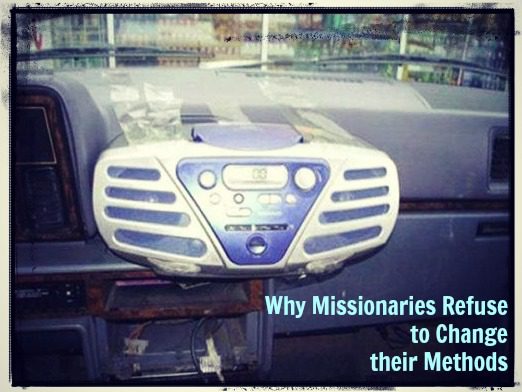There are some fundamental reasons why missionaries are very slow to change their ways.
It sometimes feels easier to help someone believe in Jesus than to convince a missionary to accept different methods of ministry. I stumbled onto some reasons that may begin to explain this.
A Typical Conversation
In conversation with others, I find people mistake me as saying one of two things, neither of which is my meaning. Before stating these mistaken impressions, I’ll first give a general sketch to describe how a typical conversation goes. In reality, this dialogue may extend for months, but you’ll get the idea. (No kidding, I have had this kind of conversation many times.)
Me: “. . . . So this is why we need to shift the way we present the gospel and do our ministry.”
Others: “Are you really just saying that all of our methods and presentations are incomplete? After all, no one can say everything all the time. The Bible is rich will imagery. A person can’t get PhD before he or she shares the gospel.”
Me: “No. That’s not what I’m saying. All gospel presentations are inherently incomplete. There is no such thing as a single ‘perfect’ presentation for all people at all times.”
Others: “Well, if everyone’s presentation is incomplete, why do you push so hard against the normal methods that everyone typically uses? Sure you are saying right things, but why does someone need to use your methods?”
Me: “I don’t have a ‘method.’ What I’m suggesting is that there are some fundamental problems that undermine our work––causing people to understand the gospel and eventually making it more difficult for Christians and churches to grow.”
Others: “It sounds like you are saying that only your ideas and methods are valid. You seem to imply that everyone else’s methods are bad. It’s as if you think people are just wasting their time.”
Me: “Not at all. I’ve never thought nor implied as much.”
Others: “God can use anything to save people, even our flawed and imperfect theologies and ministry tools. You make it sound like we have to get the presentation exactly right or else God can’t use it.”
Me: “Once again, no. I’m not talking about style. God only uses imperfect people who forget to say this or that thing. My point is different. Even if our presentations are full of truth, we have to recognize the fact that how we share can undermine what we are saying.
Just because the Holy Spirit can do whatever he wants, this doesn’t mean we should aim to preach in ways that are fundamentally flawed, either theologically or with respect to our context.
The Excluded Middle of Ministry Strategy
What’s the problem here? My conversation partner assumes that I am merely saying that certain other methods are “incomplete” or that others are doing “bad.” On the one hand, if everyone uses an approach that is “incomplete,” then why do I care so much? In effect, they’re saying “To each his own. You do your thing. I’ll do mine.” On the other hand, if they mistake me as saying conventional methods are all “bad,” then they dismiss what I’m saying as ludicrous or arrogant.
This is a false dichotomy. Notice that each response gives the listener a convenient reason to keep doing whatever he or she has always done. People have excluded from their minds any answer that lies between these two extremes.
Between “incomplete” and “bad” is simply “deficient.”
What does “deficient” mean?
Perhaps you don’t like the word “deficient.” Feel free to nominate another one.
A deficient approach has fundamental problems, even if it is true that God is still able to use it. The approach may have a lot of good to it. Nevertheless, using it is like driving your car with the emergency brake on. Not recommended if you can help it.
Here are three real life examples to further illustrate the point.
1) I became a Christian listening to a “Don’t have sleep around before marriage talk.” The sermon was full of truth, but I wouldn’t suggest we go around giving abstinence talks if we want our churches to experience rapid multiplication across multiple generations.
2) I know a woman who “came (back) to faith” simply through looking at Christian art. (I’m not sure whether she previously had genuinely accepted Christ.) It wasn’t through a sermon or reading her Bible. God was able to use it, but I think we would all agree that we shouldn’t standardize the use of this approach. If I built my strategy merely on showing people art without giving a clear biblical explanation, then I suspect people would say I had a deficient methodology.
3) I know a guy who in 8th grade took a computer science test trying so that he wouldn’t have to take the class in high school. He literally wrote “ACDC ACDC ACDC” on his answer sheet the entire way down. He didn’t even read the test questions. He turned out to be one of only two people who passed the test (out of the many who tried).
That guy was able to use the ACDC method of test taking with great success. How many of us would be willing to use it?
Humility Requires Thinking
It’s actually not always humble for a person to just be “simple.” This sort of person often separates everything into two parts. There are many versions of this way of thinking. He or she sees things either as being black-or-white, simple-or-complex, practical-or-theological, etc.
When discussing various ideas and methods, we sometimes need to complicate things. After all, real life problems cannot always be reduced to a couple of categories and three summary points. Complicated problems often require comprehensive approaches.
When we recognize this reality, we will then be ready to adjust our methods and address the needs of our ministries.
Related articles
- A Theological Version of “Don’t Ask, Don’t Tell” (www.patheos.com/blogs/jacksonwu)
- What Comes First? Biblical Theology or Evangelism Methods? (www.patheos.com/blogs/jacksonwu)

















